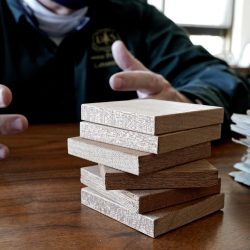Brain Cell Grafts Offer Hope against Parkinson’s
The technique is being tested on humans.

Emborg’s team was successful in reversing Parkinson’s symptoms by grafting neurons grown from monkeys’ own cells
UW–Madison researchers have successfully performed a brain cell graft in monkeys, a technique that shows promise for treating Parkinson’s disease.
Parkinson’s disease damages neurons in the brain that produce dopamine, a chemical that transmits signals between nerve cells. The disrupted signals make it progressively harder to coordinate even simple movements, causing the rigidity, slowness, and tremors that are the disease’s hallmark symptoms. Working with potential cell therapies to treat Parkinson’s disease is a particular specialty of medical physics professor Marina Emborg.
Emborg’s team worked with colleagues at the National Primate Research Center to study cynomolgus macaque monkeys. The scientists were successful in reversing Parkinson’s symptoms by grafting neurons grown from the monkeys’ own cells, called an autologous transplant. A new study by a California firm, Aspen Neuroscience, then tested the technique in humans, providing hope for those struggling with a debilitating disease.
“Our results were all so exciting,” Emborg says. “And then, when I saw they had been able to begin with a human patient this spring, I just had tears in my eyes.”
Published in the Winter 2024 issue



Comments
No comments posted yet.